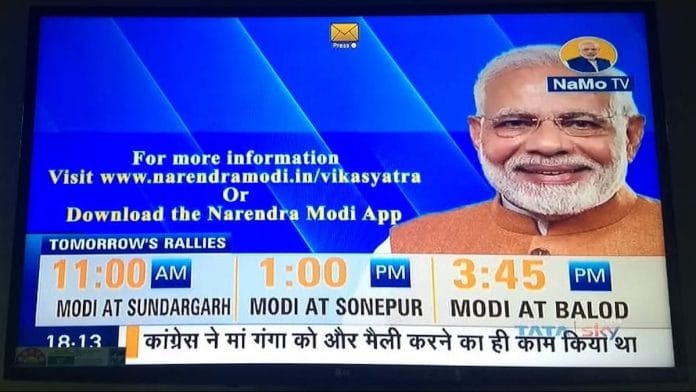New Delhi: As it barred NaMo TV Thursday from airing content that had not been pre-certified by the Election Commission, the poll panel cited a 2004 Supreme Court order regulating political advertisements on electronic media that the Bharatiya Janata Party (BJP) seems to have violated.
The order, delivered on 13 April 2004 and known as the Secretary, Ministry of Information and Broadcasting Vs. M/s Gemini TV case, came just a week before the 2004 general election season kicked in.
While expressing concern over what they termed “political mudslinging” on election eve, a three-judge bench of the Supreme Court had said, “We are in the midst of watching a great cricket series and we do not want it to be substituted by a competition or a match in political mudslinging.”
The Indian team was in Pakistan for a test series when the judgment was delivered. The Ministry of Information & Broadcasting had moved the court after the Andhra Pradesh High Court suspended the operation of the provision in the Cable Television Network (Regulation) Rules, 1994, that prohibited political advertisements.
Through its order, the court sought to ensure that surrogate advertisements are not shown by television channels and cable networks, and asked the Election Commission to monitor such content.
The judgment clearly lay down the procedure for political advertising on electronic media.
“Every registered, national and state, political party and every contesting candidate proposing to issue advertisement on television channel and/or cable network will have to apply to the Election Commission/designated officer [as designated by the Election Commission] not later than three days prior to the date of the proposed commencement of the telecast of such advertisement,” the judgment says.
The judgment further delineates the details which the application to the EC must contain. These include: The cost of production of the advertisement, the approximate cost of its proposed telecast on a television channel or cable network — with the breakup of number of insertions and the rate proposed for each such insertion, a statement on whether the advertisement inserted will benefit the prospects of a candidate or party, and a statement that all the payments shall be made by way of cheque or demand draft.
Also read: EC bars NaMo TV from airing political content without pre-certification
How NaMo TV has possibly violated the judgment
NaMo TV landed on Indian television screens towards the end of March, beaming older speeches and political rallies of PM Narendra Modi.
According to the Information and Broadcasting Ministry’s response to the Election Commission on NaMo TV, the channel is an “advertorial platform” for which the BJP is incurring the cost — thereby qualifying its content as political advertisement.
Given that the Delhi chief electoral officer only cleared the logo of the channel, and not its content, its telecast thus far could constitute a violation of the 2004 Supreme Court judgment.
The Election Commission had said Thursday that all content telecast on NaMo TV needs to be pre-certified by the poll panel or “immediately” removed.
The poll panel subsequently directed the Delhi chief electoral officer, who had told the EC that no pre-certification had been sought for the content telecast on NaMo TV, to implement its order and prepare a compliance report in this regard.
Also read: NaMo TV’s logo certified, not its content as it contained PM’s old speeches: Delhi CEO to EC






